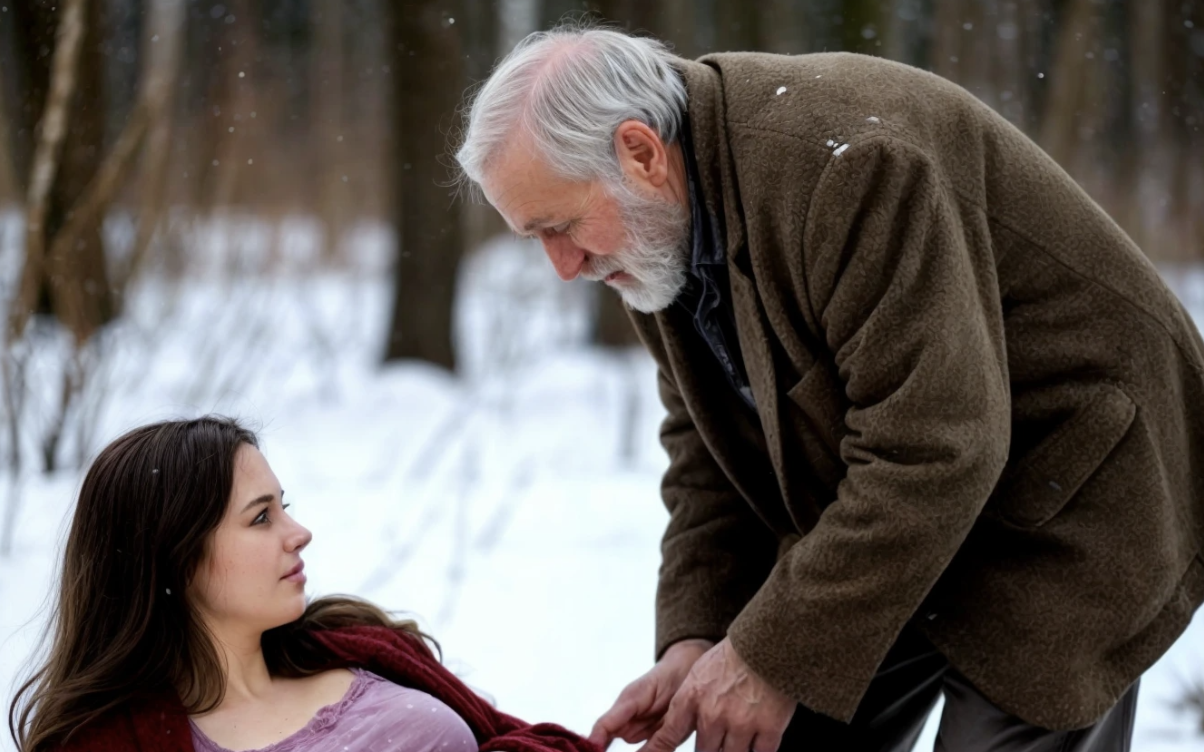Vasily Stepanovich lived at the edge of the village, where time seemed to have stopped. His little old house, as if pressed to the ground from weariness, was surrounded by a crooked fence and creaky gates that no one had repaired for a long time. Around him — silence. The whole street had died out: neighbors had moved away, some went to the city, others — to eternity. Only memory and recollections remained.
He was seventy years old. For a full forty years, he had served people — as a feldsher (paramedic) at the local clinic, which was now closed, along with everything that connected him to the past. After his wife’s death, he was left alone. His children were rare visitors, sometimes calling, sometimes remembering. But he had long grown accustomed to loneliness. The habit had become his shield, his protection from pain and unnecessary conversations.
That year, winter came early and harsh. The wind howled so fiercely that even the sturdiest window frames trembled from its rage. Snow fell in thick walls, tearing off roofs and swirling in the air, as if trying to carry away the last traces of human life.
Vasily Stepanovich’s house was the only one where a light bulb still burned. He stoked the stove, prepared a modest dinner — potatoes boiled in their skins and a couple of salty pickles from the barrel. This was how he always ate, simply and without fuss. Nothing fancy, nothing unnecessary.
He was almost about to go to bed when he heard a strange sound. At first glance — just the usual howl of the blizzard. But then again. Quiet, almost a whisper, as if someone was asking for help. His heart froze, then suddenly beat faster.
It wasn’t just alarm. It was professional sensitivity, which he had never lost in all his years working in emergency care. And it came back to him, awakening as a sharp pain in his chest.
He quickly put on his sheepskin coat, slipped on his felt boots, took his flashlight — the very one with the worn-out casing that had saved him many times on night calls. He stepped outside. The cold hit his face; his breath turned into a white cloud of steam. Step by step, listening carefully to every sound, he walked along the road until he noticed a silhouette at the roadside.
At first, it seemed like a sack or some trash. But as he got closer, he realized: it was a person. A woman. She was crawling in the snow, leaving a faint trail behind her. Her fingers were blue, her lips trembling, and her belly, under an old coat, was sticking out — she was pregnant. Close to giving birth.
Vasily knelt down beside her. Carefully leaned toward her:
“Girl… can you hear me?”
She slowly opened her eyes, looked at him with difficulty, and whispered:
“Help… me… it hurts so much…”
And lost consciousness.
The old man didn’t hesitate for a second. He gently lifted her — she was incredibly light, as if not alive, but a shadow. It seemed life itself was slipping out of her. He slowly trudged back, overcoming snowdrifts, gusts of wind, cold, and his age.
His thoughts were confused, but one thing was clear: if he didn’t make it in time, two would die — she and the child inside her.
When he reached home, the blizzard seemed even fiercer, but stepping over the threshold, he felt something long forgotten ignite inside — the fire of life, purpose, necessity. The house that had held only silence for years suddenly filled with chaos, warmth, and hope.
He laid the woman on an old but warm bed, covered her with several blankets, stoked the stove so that the flames roared in the chimney. Water boiled on the stove. He recalled everything he knew about childbirth — though many years had passed, his hands remembered what to do.
The woman was unconscious, her body convulsed with spasms, her forehead covered with sweat. Vasily ran to the shed, fetched an old wooden box — inside was everything that might be needed: bandages, antiseptics, scissors, even a clean swaddling cloth left “just in case” many years ago.
He put his hand on her forehead — a fever. Then checked her pulse — weak but steady. Moistened her lips with water and spoke softly:
“Wake up, girl. You’re home. No one will abandon you.”
She opened her eyes. A faint spark of life flickered there.
“The baby… he… soon… pain…”
“Hold on. I’m here. We’ll manage. I promise.”
The process began. And it was agonizing. But Vasily did not spare himself. He carried water, changed sheets, helped her breathe, supported her when the woman wanted to give up. At that moment, he felt no age, no back pain, no cold creeping through the walls. He was again who he had been all his life — a feldsher, a rescuer, a friend.
And then, in the middle of the night, a cry sounded. Loud, clear, filled with life. A little boy was born — red, wrinkled, but alive. The woman cried. Vasily carefully wrapped the baby in the swaddling cloth and placed him on his mother’s chest.
For the first time in many years, he felt his own eyes grow moist. He whispered:
“Welcome, little one. You came into the world on the darkest night. Maybe that’s why you will bring the light.”
Morning came unnoticed. The snow was still falling, but the blizzard had calmed. Through the fogged window, soft grayish light entered the house.
Vasily sat in a chair holding a cup of hot tea. The woman slept, holding her son close, now peacefully, with a slight smile. When she woke, her gaze became clear. Gratitude sparkled in her eyes.
“Good morning! How do you feel?” he asked, approaching and straightening the blanket.
“Better… thank you. You… you saved us!”
Tears filled her eyes.
“You did everything, girl. I just helped a little.”
She was silent, then with effort sat up on the pillow.
“My name is Marina. I ran away…” her voice trembled. “My father kicked me out when he found out I was pregnant. He said I had brought shame to the family. I didn’t know where to go. I walked along the road until my legs gave out. I thought I’d die.”
Vasily listened silently. There was no judgment in his eyes. Only sympathy and understanding. He had long understood: in life there is no black or white. There are only people trying to survive.
“Where did you live before?”
“Near Vologda. I have no one left… except him.” She looked at the baby. “I will name him Alexey.”
Vasily nodded. The name was strong, reliable, as if given by fate.
“So now you have a new path. No one here will judge you. In this village, truth has almost disappeared, but you will have a roof, silence, warmth… and the company of an old grump like me.”
Marina smiled through her tears.
“I would really like to stay… I don’t even know your name.”
“Vasily Stepanovich. Just Vasily, if you want.”
They fell silent. A calm, rare and precious, hung between them. She pressed the baby to herself, and he went to pour more tea.
A quiet life was beginning again — unexpectedly, unplanned, but with hope.
Several weeks passed. Winter slowly gave way. Snowdrifts still stood high, but the days grew longer, and the sun already warmed like spring.
Laughter sounded again in Vasily Stepanovich’s house — childlike, ringing. Little Lesha grew quickly, and Marina every day filled the house with care, warmth, and energy that the old man seemed to have long forgotten.
One morning, there was a knock on the door. It happened rarely — the village was long deserted, and those who remained knew: people didn’t visit Vasily Stepanovich just like that.
He opened the door. A man stood on the threshold, wearing an expensive coat, with a cold gaze and confused thoughts.
“Does Marina Karpova live here?”
Vasily darkened.
“And who is asking?”
“I’m her father. I was told she might be here.”
Behind him appeared Marina. She froze. Her eyes widened. The moment stretched into eternity.
“Dad…”
He stepped forward. His face was older than she remembered. In his eyes — uncertainty, remorse.
“I searched for you. I understood everything when I found out you were alive. Forgive me… I had no right…”
Marina was silent. In her gaze — not only pain but also strength. The strength that passed through the blizzard, birth, and loneliness.
“Why did you come?”
“Because I can no longer live with what I did. I wanted to see my grandson… at least once. And, if you allow, to help.”
She looked at him for a long time, then shifted her gaze to Lesha, who peacefully slept in her arms. Slowly stepped aside and said:
“Come in. But know this: I am no longer that girl you cast out. I am a mother. And this house is my fortress.”
Vasily stood aside. He said nothing but felt pride inside. And quiet gratitude for being there when she needed support.
He thought to himself:
“That even in the harshest winter, fate can give a second chance. The main thing is not to pass by those who have frozen in loneliness.”



